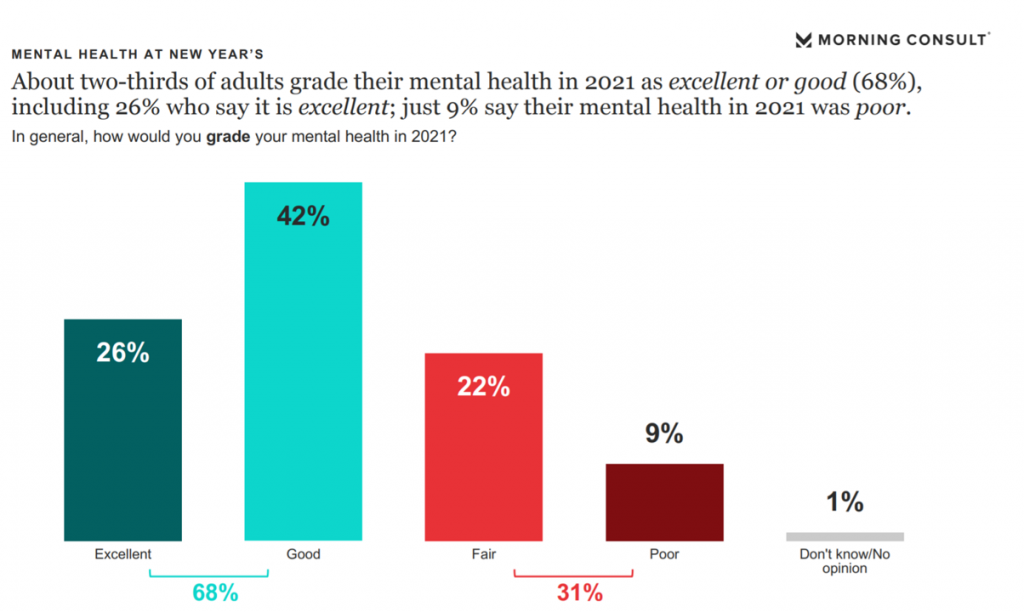 As we enter COVID-19’s “junior year,” one unifying experience shared by most humans are feelings of pandemic fatigue: anxiety, grief, burnout, which together diminish our mental health. There are many signposts pointing to the various flavors of mental and behavioral health challenges, from younger peoples’ greater risk of depression and suicide ideation to increased deaths of despair due to overdose among middle-aged people.
As we enter COVID-19’s “junior year,” one unifying experience shared by most humans are feelings of pandemic fatigue: anxiety, grief, burnout, which together diminish our mental health. There are many signposts pointing to the various flavors of mental and behavioral health challenges, from younger peoples’ greater risk of depression and suicide ideation to increased deaths of despair due to overdose among middle-aged people.
And about one-in-three Americans has made a 2022 New Year’s resolution involving some aspect of mental health, the American Psychiatric Association noted approaching the 2021 winter holiday season.
Underneath this overall statistic are important differences across various groups of people that will be important to bear in mind as we learn about the new-new digital health and connected home innovations being unveiled at CES 2022, the annual convening of consumer electronics stakeholders.
Younger people, Moms, people earning lower incomes, and people of color are feeling less mentally well entering 2022 than consumers in other demographic groups, the APA/Morning Consult poll found.
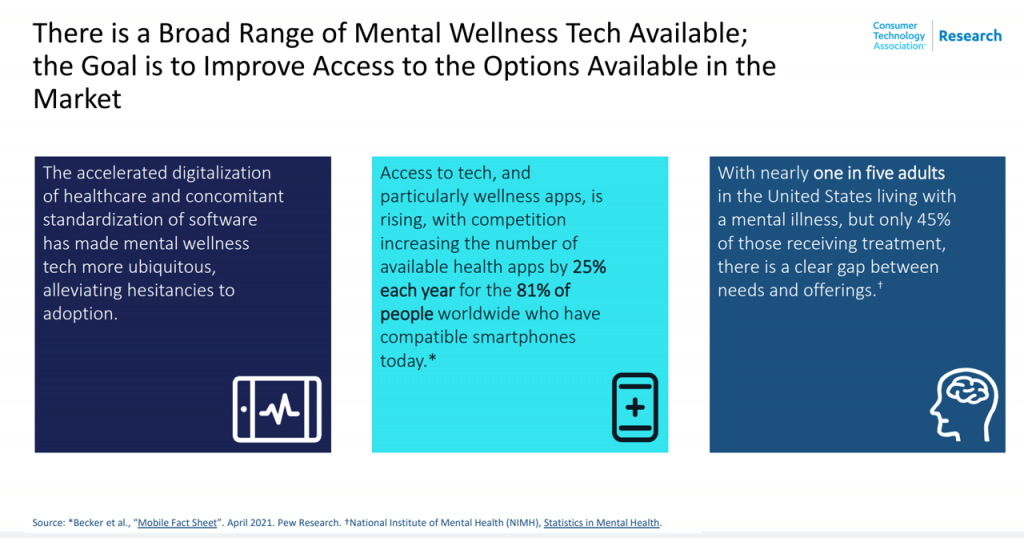 A new report was published in December 2021 by CES’s convener, the Consumer Technology Association (CTA), titled the Mental Wellness Technology Landscape — just in time for #CES2022.
A new report was published in December 2021 by CES’s convener, the Consumer Technology Association (CTA), titled the Mental Wellness Technology Landscape — just in time for #CES2022.
The report’s focus is on the convergence of mental and behavioral health with technology, describing the range of mental wellness tech available in the market.
The first graphic, from the report, notes that mental health tech’s growth is built on expanding standards development, peoples’ access largely via smartphone ubiquity, and growing recognition and acceptance of mental health as a condition shared by so many people — particularly exacerbated during the pandemic.
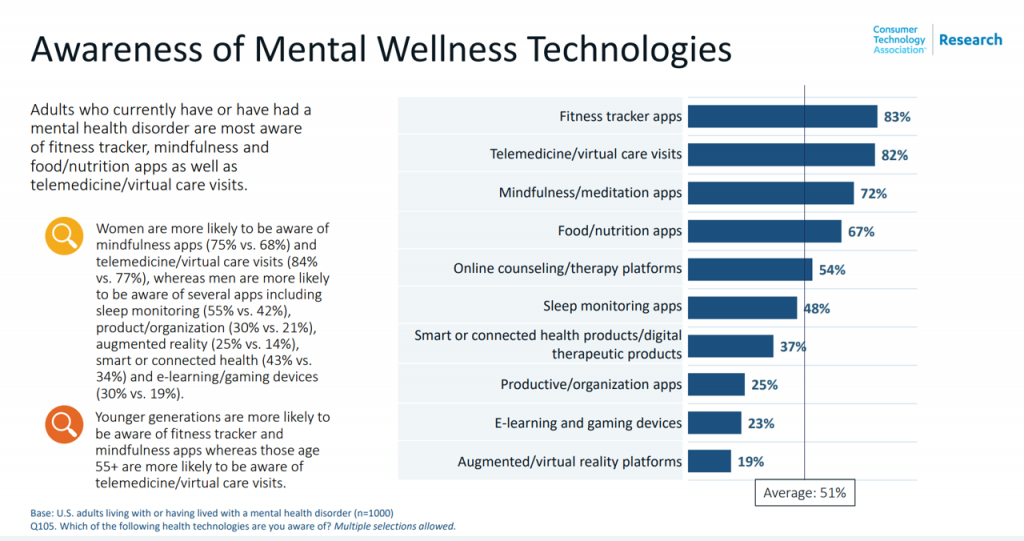 CES has been a launch pad for digital health for some fourteen years, in the earliest era featuring fitness tracking with the likes of Fitbit, Nike, and Under Armour playing leading roles in the then-narrow category on the show floor.
CES has been a launch pad for digital health for some fourteen years, in the earliest era featuring fitness tracking with the likes of Fitbit, Nike, and Under Armour playing leading roles in the then-narrow category on the show floor.
This week, digital health will span from head to toe, from body (outside and in) to the home and connected car.
The second chart from CTA’s report illustrates’ consumers’ awareness of mental wellness technologies relative to other digital health techs — with fitness tracker apps and telehealth visits best-known among the many items in the digital health portfolio.
Mindfulness and meditation apps, food and nutrition, are also well known by over 50% of U.S. consumers.
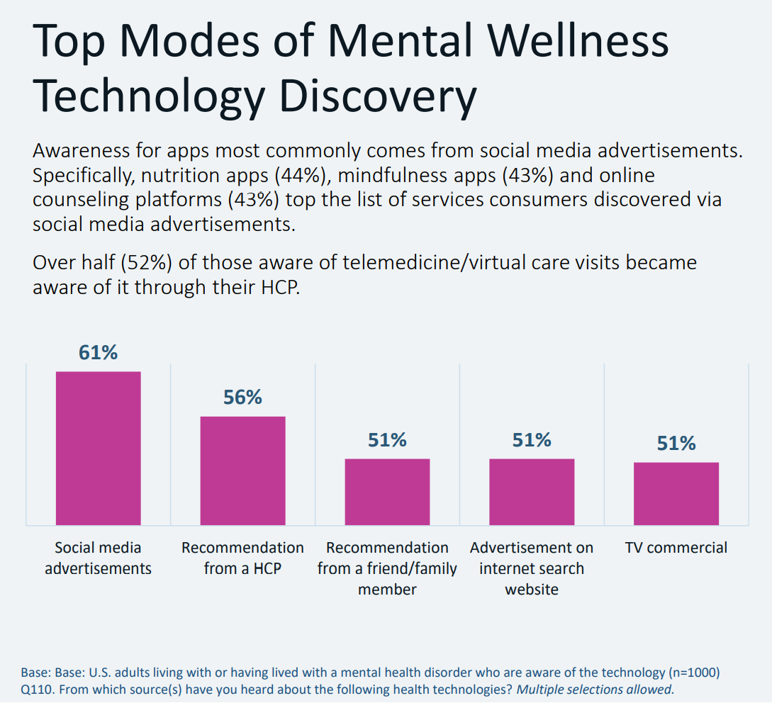 The COVID-19 pandemic certainly accelerated the fast-adoption of telehealth for all kinds of patient questions and needs starting in the late second quarter of 2020. Mental health spiked up for virtual visits and to this day, is among the medical services in highest demand for virtual platforms.
The COVID-19 pandemic certainly accelerated the fast-adoption of telehealth for all kinds of patient questions and needs starting in the late second quarter of 2020. Mental health spiked up for virtual visits and to this day, is among the medical services in highest demand for virtual platforms.
How do people become aware of mental wellness tech? CTA wondered in the consumer study. Importantly, most consumers learn about virtual care for mental health via social media advertisements (61%), followed by 56% finding out about mental health tech through a physician’s recommendation, and 51% from…
- A friend or family member
- An ad through an internet search engine, or
- A TV commercial.
Given the lack of supply access to therapists in consumers’ hometowns as well as the taboo that mental health still has in many communities, it is not surprising that people are learning about mental health tech via the internet — and in this instance, via ads placed in social media (THINK: Facebook).
It is good to see that 1 in 2 patients said they had received a mental health tech recommendation (“prescription” with a small “p”) through a health care provider.
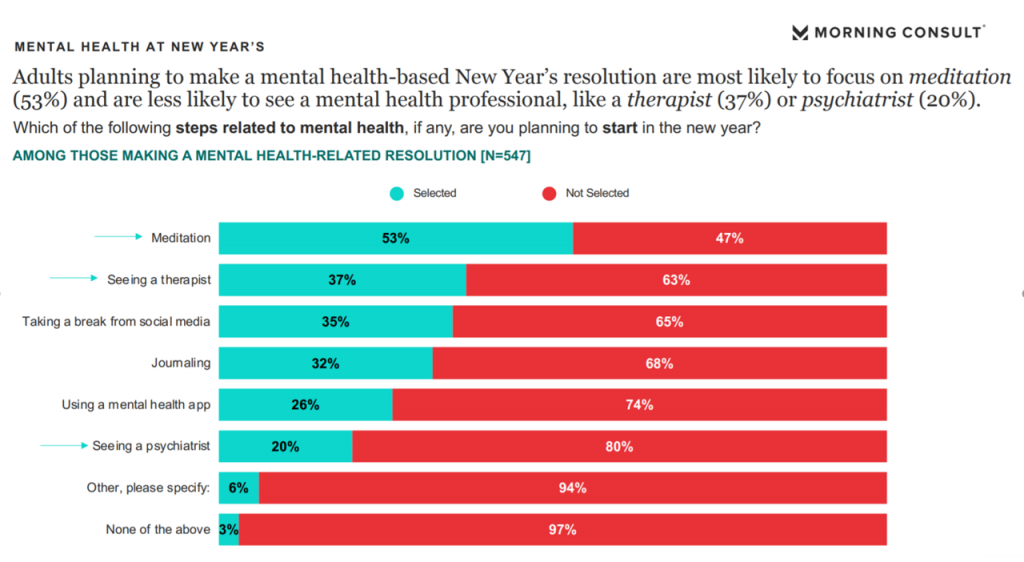 Health Populi’s Hot Points: In this first week of January 2022 with CES kicking off its show of digital health innovations, along with other consumer categories of electronics at home and in connected cars (which I covered here in Health Populi back in 2007 before I began to attend CES!), I point you to APA’s 2022 New Year’s Resolutions for mental health shown in more granularity in this bar chart from the Morning Consult poll.
Health Populi’s Hot Points: In this first week of January 2022 with CES kicking off its show of digital health innovations, along with other consumer categories of electronics at home and in connected cars (which I covered here in Health Populi back in 2007 before I began to attend CES!), I point you to APA’s 2022 New Year’s Resolutions for mental health shown in more granularity in this bar chart from the Morning Consult poll.
Note that 1 in 2 people were interested in dealing with that mental health intention through a meditation tool or app, and over 1 in 3 people by seeing a therapist. Another one in 4 people would seek support from a mental health app, and 1 in five seeing a psychiatrist.
CES 2022 will feature innovations as well as content to address these pent-up demands to support consumers’ mental wellness. It’s important to walk beyond the digital health aisles to think outside of the strictly-healthcare box to deal with peoples’ well-being factors adjacent to the purely medical.
For example, given women’s greater risk of mental unwellness found in the APA study (and other polls, as well), CES 2022 will feature tools and content on “fem tech” as well as home-keeping tools that can streamline hygiene, home cooking, working from home, and other life-flows that add friction to daily living — or relieve it. Stress about personal finances, too, afflicts women more than men based on APA’s survey findings.
So addressing the consumer’s sense of value-for-money in delivering well-designed products that deliver on their product promise and attributes along with enchanting via design and emotional connection will especially resonate with us in our “junior year” of the pandemic…and beyond.


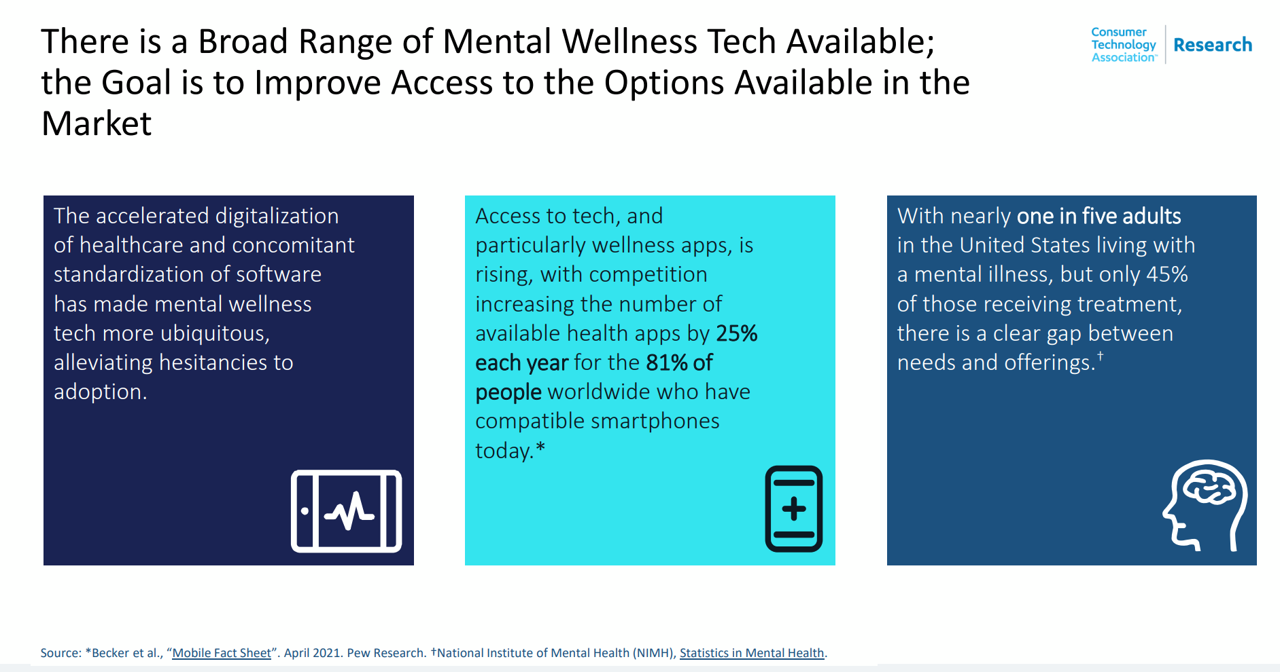


 I was invited to be a Judge for the upcoming
I was invited to be a Judge for the upcoming 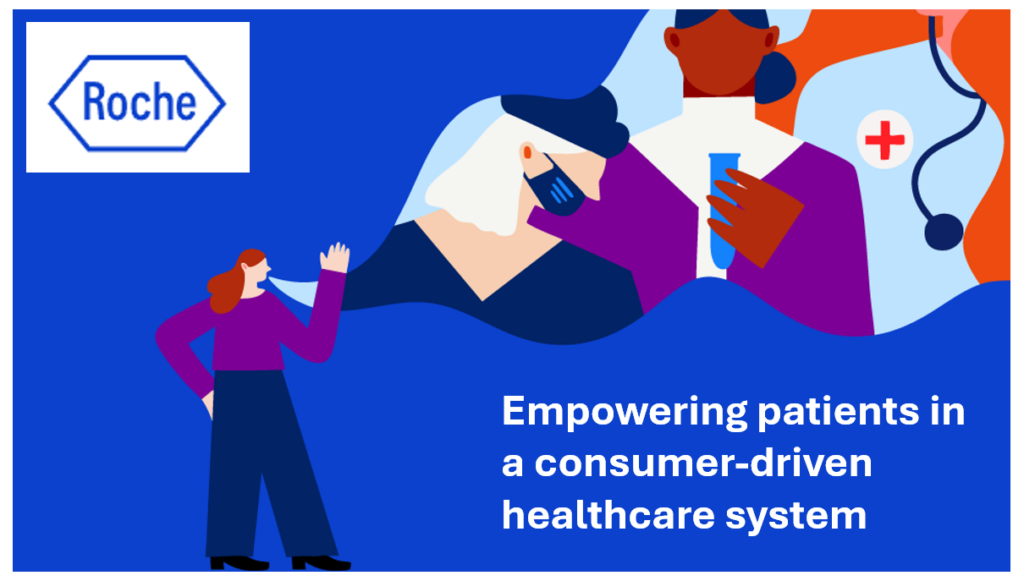 Thank you Team Roche for inviting me to brainstorm patients as health citizens, consumers, payers, and voters
Thank you Team Roche for inviting me to brainstorm patients as health citizens, consumers, payers, and voters  For the past 15 years,
For the past 15 years,